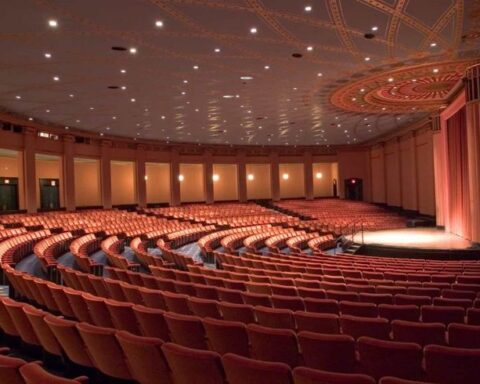Understanding the Symbolism of Altars in Dreams
Altars as Places of Spiritual Connection
Altars are often used as a symbol of spiritual connection and meaning in dreams, representing a place where the individual can connect with their inner self, higher power, or spiritual guides.
Dreaming about an altar may indicate that you are seeking a deeper level of spirituality or meaning in your life, and are looking for ways to connect with something greater than yourself.
The type of items on the altar in your dream can also provide insight into what aspect of your spirituality is being called upon:
- Fruits or vegetables may symbolize abundance, fertility, and growth
- Candles may represent light, clarity, and spiritual illumination
- Incense sticks may indicate a desire for spiritual growth and purification
- Symbols or statues of deities may represent the individual’s connection to their own power and strength
The location of the altar in your dream can also hold significance:
- An indoor altar may symbolize a desire for inner growth, introspection, and spiritual practice
- An outdoor altar may represent a connection to nature, the elements, or a higher power
Altars can also serve as a place of personal ritual and ceremony in dreams, representing an opportunity for the individual to create sacred space and honor their own spiritual journey.
In addition, altars can be seen as a symbol of transformation, renewal, and growth:
- An altar may represent a turning point or crossroads in your life
- A new altar being built may indicate the creation of something new and positive in your life
It’s worth noting that dreams about altars can be highly personal and symbolic, and may require some reflection and contemplation to understand their full meaning.
Represent a connection to something higher than oneself, such as a deity or spiritual entity
Altars in dreams often symbolize a connection to something higher than oneself, serving as a bridge between the physical and spiritual realms. They can represent the inner self’s desire for transcendence, unity, or a deeper understanding of one’s place in the universe.
The presence of an altar in a dream can signify the need to seek guidance from a higher power, whether it be a deity, spirit guide, or a symbol of one’s own higher consciousness. It may indicate that the subconscious is calling for introspection and self-reflection, urging the individual to tap into their inner wisdom and connect with their spiritual core.
The state of the altar in the dream can also provide insight into the individual’s current relationship with their spirituality. For example:
If the altar is immaculately set and adorned with offerings, it may indicate that the individual feels connected to their higher self and is actively nurturing their spiritual growth.
On the other hand, if the altar appears neglected or dirty, it could suggest feelings of disconnection from one’s spirituality or a sense of being ungrounded in daily life.
The objects placed on the altar can also hold significance. These may include:
Religious or spiritual symbols, such as crosses, crescent moons, or other icons, representing a connection to a specific faith tradition or spiritual practice.
Personal items like photographs, jewelry, or heirlooms, which might symbolize the individual’s emotional connections and relationships with others.
Candles, incense, or other offerings, which could represent the desire for purification, protection, or blessings from a higher power.
The location of the altar in the dream can also hold meaning. For instance:
A dream where the altar is situated in a peaceful, serene environment may indicate that the individual needs to cultivate a sense of calm and inner peace in their waking life.
Conversely, an altar located in a chaotic or disturbing setting could suggest feelings of spiritual turmoil or a need to re-establish balance within oneself.
Ultimately, the symbolism of altars in dreams serves as a reminder that there is always something greater than ourselves at work. By paying attention to these symbols and their associated emotions, we can deepen our understanding of ourselves and the world around us, fostering a more profound connection to the mystery that lies beyond the veil of the mundane.
Often associated with ancient cultures’ practices and rituals
The altar has been a staple in ancient cultures’ practices and rituals, often symbolizing spirituality, worship, and sacrifice. In dreams, altars can hold significant meaning and are worthy of interpretation.
To understand the symbolism of altars in dreams, it’s essential to consider their historical context and cultural associations. Ancient civilizations such as the Egyptians, Greeks, and Romans used altars for various purposes, including offerings to gods, purification rites, and sacred rituals.
The appearance of an altar in a dream may indicate that you’re seeking spiritual guidance or a deeper connection with your higher self. It could also represent a desire for purification or cleansing from negative energies or patterns in your life.
Altars often feature images or statues of deities, symbols, and artifacts that hold sacred meaning. In dreams, these elements can serve as reminders or messages from the subconscious mind. For example:
- An altar with a statue of a particular deity may indicate a need to embody qualities associated with that god, such as courage, wisdom, or compassion.
- The presence of specific symbols on an altar can signify themes or aspects of your life you’re currently navigating, like transformation, abundance, or creativity.
- The number and arrangement of artifacts on the altar may represent different stages of growth or areas of life that require attention, such as relationships, career, or personal development.
Altars in dreams can also symbolize transition or passage from one phase to another. For instance:
- A dream featuring an altar with offerings being burned may signify releasing old patterns or energies and preparing for new beginnings.
- An altar surrounded by flames or smoke could indicate a need to clear emotional baggage or let go of negative thought patterns.
In some cases, altars in dreams can be associated with unresolved issues or unconscious conflicts. For example:
- A dream about an abandoned or desecrated altar may suggest feelings of disconnection from your spiritual self or a sense of neglecting your inner needs.
- Altars in ruins or disrepair can represent shattered dreams, broken relationships, or lost opportunities.
It’s essential to consider the context and emotions surrounding the altar in your dream. Reflect on any sensations, smells, or sounds associated with it, as these can provide additional insight into its symbolic meaning.
Ultimately, the interpretation of an altar in a dream is unique to each individual and depends on their personal experiences, emotions, and motivations. Take time to reflect on your own connections to spirituality, rituals, and symbolism to unlock the deeper meaning behind this powerful symbol.
May symbolize a desire for transcendence or a need to tap into one’s spirituality
An altar in a dream can be a potent symbol that carries significant meaning, particularly when it comes to our spiritual and emotional lives.
The presence of an altar in a dream often suggests that the unconscious mind is seeking a deeper connection with one’s inner self or a higher power.
On a more literal level, altars are typically associated with worship, prayer, and ritualistic practices. In the context of a dream, this can indicate a desire for transcendence or a need to tap into one’s spirituality.
The altar may also represent a place of refuge or sanctuary, where the individual feels safe and protected from the external world.
Another possible interpretation is that the altar symbolizes a personal quest for enlightenment, self-discovery, or spiritual growth.
The presence of specific objects on the altar, such as candles, incense, or offerings, can also hold significance. For instance, a lit candle may signify a desire for illumination, guidance, or hope, while incense could represent purification, cleansing, or spiritual purification.
Certain colors associated with altars in dreams can also provide insight into the symbolic meaning. For example, white or silver may symbolize clarity, purity, and spiritual growth, whereas red or gold could indicate passion, energy, or material wealth.
The condition of the altar itself is equally important. A well-maintained altar may represent a sense of balance, harmony, and order in one’s life. In contrast, an untidy or neglected altar could symbolize neglect, chaos, or unresolved issues.
Considering the individual’s emotional state at the time of the dream can also aid in interpretation. If the dreamer feels anxious, stressed, or overwhelmed, the presence of an altar may suggest a need for refuge, solace, or spiritual guidance.
The role and actions of others within the dream are also crucial. For instance, if someone else is tending to the altar, this could indicate support, guidance, or assistance in one’s spiritual journey. Conversely, if others appear to be disrupting the ritual or altar space, it may signify resistance, skepticism, or challenges to one’s spirituality.
In conclusion, an altar in a dream represents a complex and multifaceted symbol that invites exploration of the individual’s emotional, spiritual, and psychological landscape. By considering the context of the dream and the symbolism associated with altars, individuals can gain valuable insights into their own desires, needs, and aspirations.
Personal and Emotional Significance of Altars in Dreams
Altars as Reflections of the Self
An altar in a dream can hold profound personal and emotional significance, reflecting the inner world of the individual. The altar itself serves as a symbolic representation of the self, encompassing various aspects of one’s personality, thoughts, and emotions.
The presence of an altar in a dream often indicates a desire for spiritual growth, connection with the divine, or a need to re-evaluate priorities in life. It may signify a yearning for transcendence, a higher state of consciousness, or a deeper understanding of oneself and one’s place in the world.
The type of items placed on the altar can offer insight into specific areas of concern or focus in the dreamer’s waking life. For instance, offerings of flowers might symbolize nurturing emotions or a desire for beauty and harmony in one’s surroundings.
Candles, often associated with spiritual practices, may represent the need for illumination, guidance, or a desire to shed light on a particular situation or aspect of oneself. They could also signify a call to nurture one’s inner flame, encouraging self-reflection and introspection.
The act of building or tending to an altar in a dream can be seen as an exercise in self-care, self-love, or self-acceptance. It may represent the need to acknowledge and honor various aspects of oneself, whether it be one’s passions, values, or emotional needs.
Conversely, an altar that is neglected, broken, or surrounded by chaos can signify feelings of disconnection from one’s inner self, spiritual neglect, or a sense of being lost in life. It may serve as a prompt to re-examine priorities and make necessary changes to reignite a sense of purpose and meaning.
Altars in dreams often contain symbolic objects that mirror the dreamer’s fears, desires, or unresolved emotional conflicts. These symbols can provide insight into underlying psychological dynamics, helping individuals better understand themselves and work through challenges.
In many cultures, altars serve as a means of communication between humans and deities, ancestors, or spiritual forces. In dreams, this connection can be seen as an invitation to tap into one’s own inner wisdom, intuition, or higher guidance.
The emotional significance of altars in dreams often relates to feelings of reverence, awe, or wonder. The experience can evoke a sense of connection to something greater than oneself, inspiring gratitude and humility.
Altars in dreams may also symbolize the need for balance between opposing forces within oneself, such as reason and emotion, logic and intuition, or light and darkness. By acknowledging and honoring these dualities, individuals can strive for integration and wholeness.
Ultimately, the personal and emotional significance of altars in dreams lies in their ability to reflect one’s inner world, highlighting areas of growth, self-awareness, and spiritual evolution. By exploring the symbolism and themes associated with an altar in a dream, individuals can gain deeper insights into themselves and navigate the complexities of life with greater wisdom and compassion.
Can represent a part of oneself that is hidden, neglected, or suppressed
An altar in a dream can hold profound personal and emotional significance, serving as a symbolic representation of various aspects of one’s psyche.
In the realm of dreams, altars often signify a connection to spiritual or higher states of being, representing a longing for transcendence or a desire to access deeper levels of consciousness.
However, an altar can also symbolize a part of oneself that is hidden, neglected, or suppressed. This may manifest as a forgotten memory, a repressed emotion, or an unresolved conflict that has been buried beneath the surface.
By examining the context and surroundings in which the altar appears in the dream, individuals can gain insight into the specific area of their psyche that requires attention and acknowledgment.
In many cases, an altar represents an aspect of one’s personality or emotional landscape that is no longer serving them. For instance, a person may find themselves standing before an abandoned or destroyed altar, symbolizing a need to release or transform aspects of their life that are holding them back.
On the other hand, an intact and well-maintained altar in a dream can represent a healthy relationship with one’s emotions and inner world. It may signify a strong sense of self-awareness, emotional intelligence, and spiritual connection.
The type of objects or offerings on the altar in the dream can also provide valuable clues about the underlying issue being addressed. For example, an empty altar might indicate a lack of meaning, purpose, or direction in waking life, while an altar cluttered with items may suggest feelings of overwhelm or confusion.
Furthermore, the actions taken towards the altar in the dream – such as approaching it, worshiping at it, or desecrating it – can reveal aspects of one’s relationship with power, authority, and personal growth. For instance, destroying an altar might symbolize a need to challenge one’s own self-destructive tendencies or overcome feelings of inadequacy.
Ultimately, the personal and emotional significance of altars in dreams encourages individuals to confront their inner world, acknowledge the parts of themselves that require attention, and cultivate a deeper understanding of their emotional landscape.
May symbolize a need for balance, harmony, or healing in one’s life
Altars in dreams can have profound personal and emotional significance, often serving as a reflection of one’s inner world and unmet needs. An altar, by definition, represents a space where spiritual or ritual practices are performed to honor a higher power, the divine, or the self.
In the context of dreams, an altar can symbolize a need for balance, harmony, or healing in one’s waking life. The dreamer may be sensing that their current circumstances are out of sync with their values, emotions, or spiritual goals, and the altar represents a longing for rebalancing these elements.
The personal significance of an altar in dreams can also relate to issues of self-care, self-love, and self-compassion. Just as an altar is typically a dedicated space where offerings are made to honor oneself, one’s spirit, or one’s values, the dreamer may be acknowledging the need for more time, attention, or care devoted to their own well-being.
The emotional significance of altars in dreams can vary widely depending on the individual and their unique experiences. For some, an altar in a dream may evoke feelings of peace, serenity, and connection to something greater than themselves; for others, it may symbolize anxiety or disconnection from their spiritual selves.
It is also possible that the appearance of an altar in dreams represents a desire to connect with one’s ancestors, cultural heritage, or spiritual traditions. This can be especially significant for individuals who have experienced cultural loss or identity fragmentation due to historical trauma or colonialism.
In terms of emotional healing, altars in dreams can represent a need for integration and reconciliation between different aspects of the self. For example, an individual may be struggling with conflicting desires or values, and the altar serves as a symbol of the desire to reconcile these opposing forces.
Ultimately, the personal and emotional significance of an altar in a dream is highly dependent on the unique context of the dreamer’s life and psyche. By paying attention to the emotions, sensations, and imagery associated with the altar, dreamers can gain valuable insight into their current needs, desires, and aspirations.
Through exploring these symbolic associations, individuals can develop a deeper understanding of themselves and cultivate a greater sense of self-awareness, compassion, and personal growth.
Associated with themes of personal growth, transformation, and selfawareness
The presence of an altar in dreams can symbolize a range of personal and emotional themes, including growth, transformation, and self-awareness.
Altars often serve as sacred spaces within our waking lives, where we honor and connect with various aspects of ourselves or the world around us.
In the realm of dreams, this symbolic structure can represent a threshold between states of consciousness, beckoning us to embark on a journey of introspection and self-discovery.
When an altar appears in your dream, it may signal that you are at a crossroads, poised to make choices that will shape your personal trajectory and influence your spiritual evolution.
The specifics of the altar itself can offer clues about the nature of this transformation: for instance, a cluttered or neglected altar might indicate feelings of disconnection from one’s own spirituality or sense of purpose.
Conversely, a beautifully adorned or well-maintained altar could suggest a strong connection to one’s higher self and a deeper understanding of personal values and goals.
The items placed on the altar may also hold significance: if they are meaningful objects from your past, such as family heirlooms or photos, it could be that you are processing memories and integrating lessons from past experiences into your present growth.
Alternatively, if the items are more abstract, like symbols of personal freedom or creativity, the dream may be urging you to tap into your inner sources of inspiration and express yourself authentically in waking life.
The act of lighting a candle or performing another ritual at the altar in your dream can represent a moment of heightened awareness or spiritual illumination – a chance to connect with your deeper self and access new insights or perspectives.
As you reflect on your dream, consider what aspects of yourself you are calling forth into awareness: Are there parts of your psyche that require attention or healing? Do you need to rekindle passion for a particular aspect of life?
The presence of an altar in dreams invites you to tend to these questions, exploring the complexities and depth of your own inner landscape.
Ultimately, the personal significance of altars in dreams is unique to each individual – a reflection of their current journey, desires, and areas of growth.
The Context of Altars in Dreams: Cultural and Psychological Significance
Altars as Symbols of Cultural Heritage and Collective Memory
The concept of altars in dreams is a rich and complex symbol that transcends cultural boundaries, reflecting both personal and collective unconscious themes. In dreams, altars often represent a threshold between different states of consciousness, serving as a symbolic bridge between the conscious and subconscious mind.
From a psychological perspective, altars in dreams may signify a desire for transcendence or connection to something greater than oneself. This could be a reflection of an individual’s search for meaning, purpose, or spiritual guidance in waking life. The altar may represent a safe space for exploration, contemplation, and introspection, where the dreamer can confront their deepest fears, desires, and unresolved issues.
From a cultural perspective, altars in dreams often evoke a sense of nostalgia and connection to one’s heritage. In many cultures, altars are revered as sacred spaces that hold memories, stories, and traditions passed down through generations. When an altar appears in a dream, it may symbolize a desire to reconnect with one’s roots, preserve cultural identity, or honor the ancestors.
Altars can also represent collective memory and shared experience, serving as a symbolic repository of history, mythology, and cultural heritage. In this sense, altars in dreams may indicate a need for personal or collective healing, reminding the dreamer of past traumas, injustices, or losses that require acknowledgment and reconciliation.
Furthermore, altars can embody the concept of liminality, existing at the threshold between different states of being. This liminal quality allows the altar to serve as a symbol of transformation, renewal, and regeneration, reflecting the dreamer’s potential for growth, change, and self-reinvention.
The context in which an altar appears in a dream can also provide valuable insights into its meaning. For example, if the altar is surrounded by candles, incense, or other ritualistic objects, it may indicate a desire for spiritual connection, introspection, or purification. Alternatively, if the altar is cluttered with broken or useless items, it could symbolize feelings of disconnection, chaos, or confusion.
In summary, altars in dreams represent a complex and multifaceted symbol that can be interpreted through both personal and collective lenses. Whether seen as a threshold between states of consciousness, a symbol of cultural heritage and shared memory, or an expression of the liminal self, the altar serves as a powerful reminder of our capacity for transformation, renewal, and connection to something greater than ourselves.
May evoke feelings of nostalgia, longing, or connection to one’s cultural heritage
The context of altars in dreams can be multifaceted and hold various meanings depending on the cultural background, personal experiences, and emotions of the individual. In this section, we will explore the cultural and psychological significance of altars in dreams.
Cultural Significance
Altars have been an integral part of many cultures throughout history, serving as a means to connect with the divine, honor ancestors, or commemorate important events. When appearing in dreams, altars can evoke feelings of nostalgia, longing, or connection to one’s cultural heritage.
List of Cultures and Their Altar Traditions
Here are some examples of cultures and their altar traditions:
- Aztec Culture: In Aztec mythology, altars were used for human sacrifice and were believed to be the connection between the physical and spiritual worlds.
- Catholicism: Catholic altars are dedicated to honoring the Holy Trinity and often feature statues of saints or symbols of faith.
- African Cultures: In many African cultures, altars are used for ancestor worship and are believed to connect the living with their ancestors.
Psychological Significance
In addition to cultural significance, altars in dreams can also have psychological implications. Altars may symbolize a desire for spiritual connection, a need for self-reflection, or a longing for a sense of community and belonging.
Interpretations of Altar Dreams
The following are some possible interpretations of altar dreams:
- Spiritual Growth: Altars may represent a desire for spiritual growth, self-reflection, or a need to connect with something greater than oneself.
- Ancestral Connection: Altars may symbolize a connection to one’s ancestors or heritage, and the dreamer may be seeking guidance or validation from their past.
- Emotional Healing: Altars can also represent a need for emotional healing, as they are often associated with rituals of cleansing, purification, or renewal.
Ultimately, the context of altars in dreams is complex and multifaceted. By examining one’s own cultural background and personal experiences, individuals can gain a deeper understanding of their altar dream meanings and tap into its symbolic significance.
Associated with themes of identity, community, and social responsibility
The context of altars in dreams can be deeply symbolic and multifaceted, reflecting various aspects of a person’s subconscious mind. On one hand, altars often represent a connection to spiritual or religious practices, signifying a desire for transcendence, higher meaning, or a sense of belonging to something greater than oneself.
In this context, an altar in a dream may symbolize a longing for spiritual growth, a need to reconnect with one’s faith or cultural heritage, or even a fear of losing touch with spiritual values. It could also represent a yearning for a deeper sense of community and connection with others, highlighting the importance of social relationships and shared experiences.
On the other hand, altars can also be associated with themes of identity, particularly in relation to cultural or personal heritage. In this sense, an altar in a dream may serve as a reminder of one’s roots, family traditions, or ancestral customs. It could symbolize a desire to explore and appreciate one’s cultural background or even to connect with one’s own spiritual or mystical side.
The presence of an altar in a dream can also be linked to psychological themes such as nostalgia, longing for the past, or a sense of disconnection from present-day life. In this case, the altar may represent a yearning for a simpler time, a loss of innocence, or a fear of change and uncertainty.
Furthermore, altars in dreams can be associated with the theme of social responsibility, reflecting a person’s feelings about their obligations to others, community expectations, or societal norms. An altar dream could indicate a sense of duty, a need for accountability, or even a fear of being judged or ostracized.
In some cultures and spiritual traditions, altars are believed to hold sacred power and energy, serving as focal points for prayer, meditation, and rituals. In this context, an altar in a dream may symbolize the desire for spiritual growth, personal transformation, or healing. It could represent a need to seek guidance from a higher power, to find inner peace, or to connect with one’s own inner wisdom.
Ultimately, the meaning of altars in dreams is highly individual and subjective, reflecting each person’s unique experiences, emotions, and concerns. By exploring the associations and symbolism linked to altars in their own dreams, individuals can gain a deeper understanding of their subconscious mind and uncover hidden insights about themselves and their place in the world.
As such, dreamers should take the time to reflect on their personal connection to altars and the themes associated with them. By doing so, they can tap into their own inner wisdom, navigate complex emotions and thoughts, and cultivate a greater sense of self-awareness and understanding.
In conclusion, the context of altars in dreams offers a rich tapestry of symbolic meanings, reflecting various aspects of human experience, including spiritual growth, personal identity, community connection, social responsibility, and emotional expression. By exploring this complex symbolism, individuals can unlock deeper insights about themselves and their place in the world, ultimately leading to greater self-awareness, empathy, and compassion.
- Baptism Dream Meaning: What Does Baptism Mean In Your Dream? - September 16, 2024
- Bumper Dream Meaning: What Does A Bumper Symbolize In Your Dream? - September 15, 2024
- Banana Dream Meaning: What Does A Banana Mean In Your Dream? - September 15, 2024







